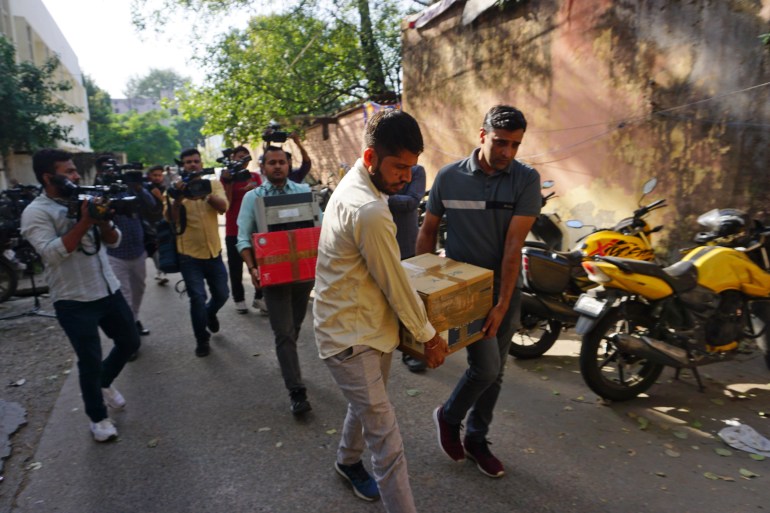EXPLAINER
The raid on NewsClick has raised international concerns about the media in India, where press freedom has plummeted.
Police in India have carried out raids against dozens of reporters, drawing outrage from journalists and rights groups over a growing crackdown on the media under Prime Minister Narendra Modi’s government.
A planned protest in the capital, New Delhi, on Wednesday was prevented by police.
Prabir Purkayastha, editor of the NewsClick website, was arrested under an anti-terrorism law on Tuesday over allegations of receiving foreign money. The homes of 44 other journalists connected to NewsClick were raided.
A spontaneous protest meeting was held at the Press Club of India against multiple raids on a number of journalists.
The meeting resolved to continue protest by several journalists bodies for defending media freedom. pic.twitter.com/StkNpENpG0
— Press Club of India (@PCITweets) October 3, 2023
Here is what we know about the media crackdown in India:
Why are Indian journalists being investigated?
In a statement, the police said 37 male suspects were questioned at the NewsClick office while nine female suspects were questioned at their residences. Their digital devices and documents were seized, without giving further details for the reason for the raid.
Police said the raids were carried out under the Unlawful Activities Prevention Act (UAPA), a stringent anti-terror law which makes it virtually impossible to get bail.
#NewsClickRaids | Senior journalist Paranjoy Guha Thakurta was questioned for nearly 10 hours. He says he was questioned on whether he covered Delhi riots and farmers’ protest. pic.twitter.com/HHBNeZa5Eq
— newslaundry (@newslaundry) October 3, 2023
What is NewsClick?
NewsClick is an English-language news website and is an independent and critical outlet with a focus on “progressive movements”. It was founded in 2009 by Purkayastha, who was also previously arrested during a state of emergency imposed by the then-Prime Minister Indira Gandhi in 1975.
In 2021, India’s domestic law enforcement agency, the Enforcement Directorate, launched raids at the NewsClick office and Purkayastha’s residence over allegations of money laundering pertaining to foreign funding. During that time, the outlet was reporting heavily on the farmers’ movement, according to local media.
What role has the New York Times played in this crackdown?
In August, the New York Times published an investigative report that alleged that NewsClick had received funds from US millionaire businessman Neville Roy Singham, who “sprinkled its coverage with Chinese government talking points”.
The report accused Singham of working closely with Beijing and of financing its propaganda internationally. This was especially controversial due to the longrunning border dispute between New Delhi and Beijing.
On August 17, days after the investigative report was published, Indian authorities registered a case against NewsClick and its journalists.
Singham and NewsClick rejected the charges. Purkayastha said at the time the allegations were not new and the website would respond to them in court.
The role of the Times in the crackdown has resulted in criticism and protests. Besides the protest that will take place at the Press Club of India, a protest was held at the New York Times building on Tuesday.
In Aug, the NYT ran a McCarthyite hit piece alleging @newsclickin was part of a Chinese propaganda network. The NYT piece sparked a political and media scandal w/in India, and today 50 of its writers arrested by police.
Solidarity w/ NewsClick against NYT’s McCarthyite smears! pic.twitter.com/K53qjOpJQA
— Radio Free Amanda 余美娜 (@catcontentonly) October 4, 2023
Activists and rights groups have sounded the alarm on press freedoms since Modi of the Bharatiya Janata Party (BJP) took office in 2014.
India has fallen to 161st in the World Press Freedom Index from 150th last year, its lowest ever. Modi’s government has rejected the group’s findings, questioning its methodology and claiming India has a free press.
Recent incidents possibly explain India’s fall on the Index.
- In September, police in Indian-administered Kashmir threatened to initiate legal action against the BBC for publishing an article about India’s crackdown on Kashmiri press.
- In August, Indian authorities blocked the website of independent Kashmiri news outlet, Kashmir Walla.
- In June, the Committee to Protect Journalists (CPJ) said journalists critical of the Indian government and the ruling BJP have been jailed, harassed and surveilled.
The INDIA alliance, a coalition of 28 opposition political parties, said that in the last nine years, the government has deliberately persecuted and suppressed the media by using investigative agencies. The “coercive” actions of Modi’s government are “directed against only those media organisations and journalists that speak truth to power,” the coalition said.
A spokesperson for the BJP said the raids were justified as foreign funding to media groups must be assessed by investigating agencies.







